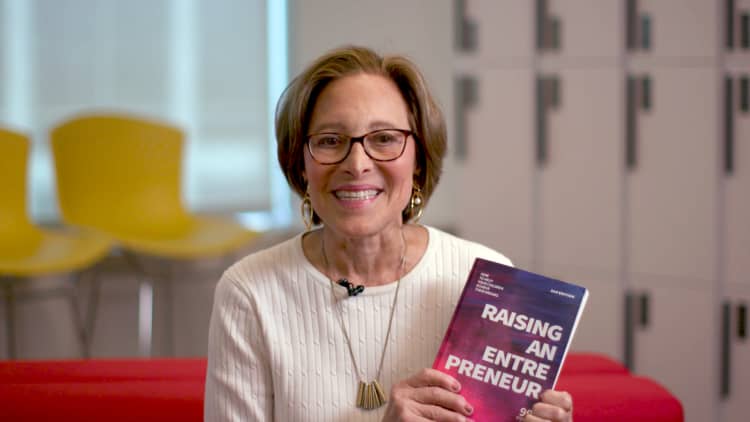Talking to David Balogun is like talking to, well, a 9-year-old.
Despite the occasional tangent about quantum entanglement, David is a kid at his core. He competes in paper airplane races with his sister, presses cupped hands to his eyes to simulate glasses and gets antsy after sitting still for too long.
"This is the normal 9-year-old part," his mother, Ronya Balogun, tells CNBC Make It as she refocuses him on the conversation.
David is one of the youngest people in the U.S. to earn a high school diploma. He graduated in late January from Reach Cyber Charter School, a tuition-free online school in his home state of Pennsylvania, and is currently enrolled in online classes at Bucks County Community College — where he says he completes a week's worth of homework in a single day.
"If I don't learn, then I probably will stay up until 4 [a.m.] and wake up at 5 [a.m.]," David says.
His parents are Ronya and Henry Balogun, who also have a younger daughter, Eliana. They first tested David's intellect when he was 6 years old, and have since scrapped many of their more conventional parenting techniques for him.
"You've got to develop a different mindset as a parent," Henry says. "It's not always easy when your son is asking you questions constantly. You have to keep answering the questions, because you don't want to say, 'Just leave me alone.'"
The Baloguns insist there's no magic parenting recipe. When it comes to raising a child like David, "there is no book on it," Ronya says.
Still, they have a No. 1 rule: When a system isn't built for your child, don't try to fix your child. Try to fix the system.
They don't push conformity
By the time David was in first grade, it was clear he wouldn't thrive in a regular classroom, Ronya says: In one incident, she learned that David's classmates listened to him more than their teacher.
So, the Baloguns got creative — if only to get him to sleep at night.
They researched Pennsylvania's Gifted Individualized Education Plan law, which mandates that school districts provide programs for gifted children. Those programs weren't enough for David, his parents say — so when the Covid-19 pandemic hit, they looked into more permanent, personalized solutions.
In 2020, they moved then-7-year-old David into the online learning program Reach Cyber, which emphasizes individualized curriculums. Later, when the College Board's Advanced Placement testing enrollment website had no option for his birth year, his parents got on the phone and had a weeks-long back-and-forth to get him on the list.
Ronya says she's had conversations with universities about David's next steps, but has to be stern about not letting her 9-year-old be in a classroom with 20-year-olds. She and Henry say they're unsure what their solution will be, but dedicated to finding a creative workaround.
"It's a different adaptation that we don't have in the United States of America yet. It's very scary, you can't find this," Ronya says, adding: "Sometimes I can't fix the system, but there are other unconventional choices and solutions to help lead my son through his journey to fulfill his dreams."
They prioritize happiness over social norms
There's a social side to this, too: When David told his mother that he didn't have friends, "it did hurt me and bother me," Ronya says. Unfortunately, it also made sense.
"I think the biggest social and emotional problem [for gifted children] is that they can't find other people like themselves," Dr. Ellen Winner, a psychologist who specializes in gifted children, told ParentEdge magazine in 2012. "The more extreme the gift, the more difficult it is."
The key, wrote clinical child psychologist Shefali Tsabary in a CNBC Make It essay last month: Understand your kids' needs and adjust, not the other way around. Rather than pressure David into building a large friend network, Ronya focuses on embracing his introversion, she says.
David says he's embraced it, diving into research on introverted people. "There was a study that suggested that introverts don't enjoy spicy food as much as extroverts," he says.
They trust their child to lead the way
When David showed that he could add and subtract negative numbers at age 6, before anyone had taught him, his parents had to believe him. By taking David at his word, Ronya says she's built a new level of trust with her child, which she adds is essential for any parent.
"I can't tell him, 'This is what you know,' because I'm not in his brain," she says. "I have to trust him to be partially leading the way."
Of course, their trust has boundaries. When he came home from school claiming to know where babies come from, Ronya says she imposed some boundaries — giving him a partial walkthrough of reproductive anatomy before authoritatively ending the conversation.
"Mind you, at this moment, I'm talking to a 6-year-old," she says.
Trust can be a powerful parenting tactic. "The more you trust your children to do things on their own, the more empowered they'll be," Esther Wojcicki, a longtime educator who raised two CEOs and a doctor, wrote in an essay for CNBC Make It last year.
But predicting David's future is a tough task, since there are few precedents. Ronya and Henry say they're learning as they go.
"There is no frame of reference," says Ronya. "So you know how sometimes when there is no path, you start a new path? Yep, that's what we're doing."
DON'T MISS: Want to be smarter and more successful with your money, work & life? Sign up for our new newsletter!
Check out:



